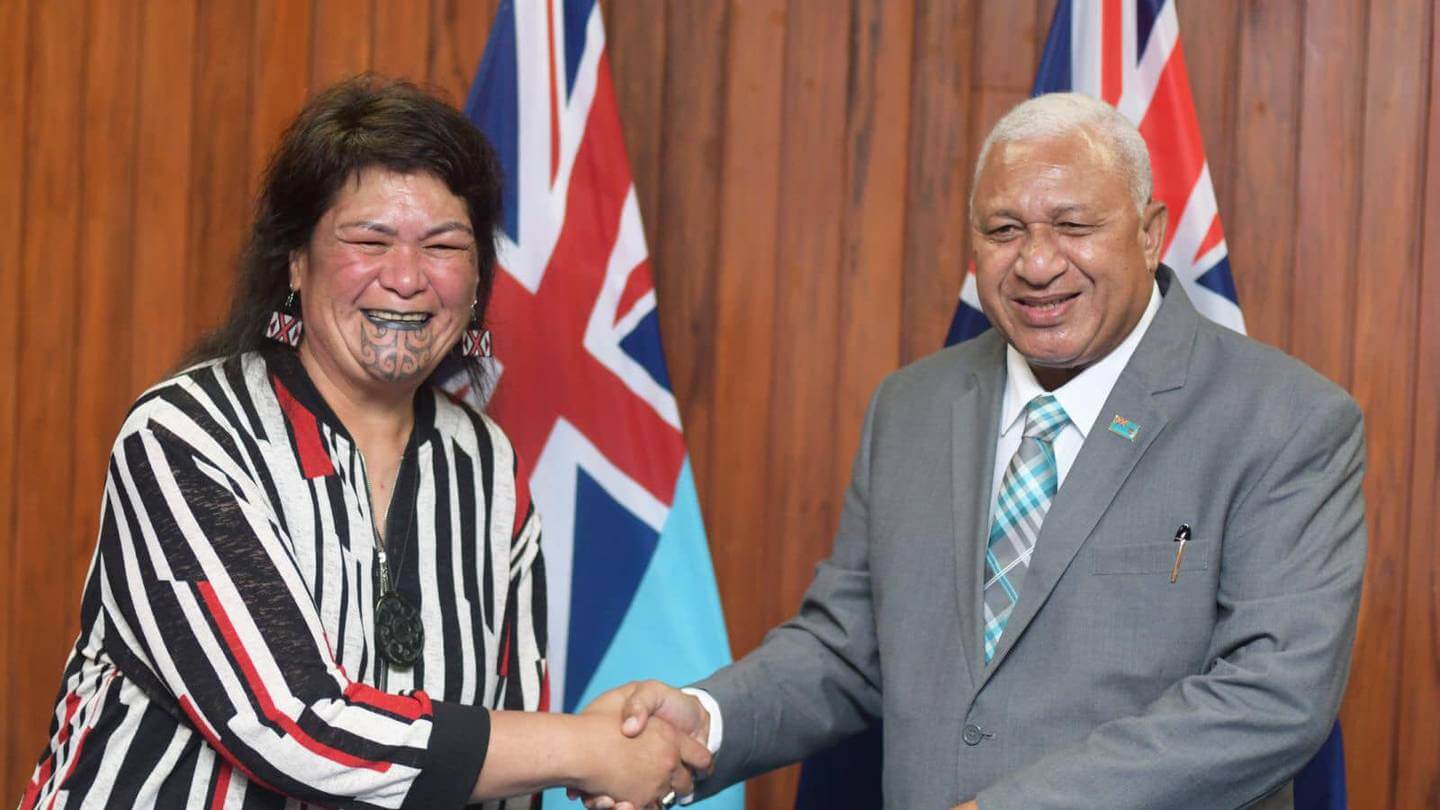On Tuesday, New Zealand (NZ) Minister of Foreign Affairs Nanaia Mahuta met with Fijian Prime Minister (PM) Josaia Voreqe Bainimarama in Suva to sign a cooperation agreement to strengthen the Indo-Pacific region in light of China’s recent security deal with the Solomon Islands.
Ni sa bula, nau mai haere mai ki Fiji 🇫🇯 Minister @NanaiaMahuta — pleased to have opportunity to focus on Aotearoa NZ’s 🇳🇿 relationship w #Fiji, our place in Te Moana-nui-a-Kiwa 🌊, & our commitment to strengthening Pacific resilience 🤝 as a region. #manaakitanga in action. pic.twitter.com/B86J9Y41EE
— Charlotte Darlow (@C_Darlow_NZ) March 28, 2022
The Duavata Partnership agreement affirms the countries’ “joint ambition to elevate their relationship to a new level of expanded strategic cooperation in the years to come based on a foundation of shared values and equal partnership, and achieved through trust and consultation.” It highlights five priority areas for cooperation: social wellbeing, security, economic resilience, democracy, climate change, and disaster resilience.
As per Wellington’s official press release, Bainimarama said, “The Duavata Partnership is a landmark achievement in the advancement of Fiji and New Zealand collaborations, which has continued to enhance over the years. It illustrates our shared commitment and vision for regional solidarity. New Zealand has been a great partner and friend to Fiji, and our partnership is the strongest ever.”
Bainimarama appreciated NZ PM Jacinda Ardern’s firm and unwavering support and thanked her for aiding Fiji’s post-pandemic recovery efforts, wherein New Zealand has extended humanitarian and budgetary support, and shared COVID-19 vaccines.
A milestone achievement was accomplished today with the signing of the Duavata Agreement by @FijiPM and NZ's Foreign Affairs Minister @NanaiaMahuta.
— Office of the Prime Minister (@fiji_opm) March 29, 2022
The Agreement reaffirms Fiji and Aotearoa New Zealand’s commitment to work together on issues of shared interests and importance. pic.twitter.com/vrFhK5qGKA
Bainimarama said the signing of the Duavata Partnership is “timely” and will bolster the countries’ common aspirations of realising “greener, bluer and resilient recovery” by prioritising the interests of the Indo-Pacific people.
Along the same lines, Mahuta said, “The new Statement of Partnership reflects our joint ambition to elevate and strengthen our relationship, and underlines the importance of Fiji to Aotearoa New Zealand as a member of our Pacific whānau.”
Aotearoa NZ has been proud to stand alongside Fiji as they’ve responded to the challenges of last 2 years. Today @FijiPM and I signed the Duvata Partnership and reaffirmed our strong 🇳🇿 🇫🇯 relationship and shared commitment to a new level of strategic cooperation. pic.twitter.com/PfA3WLAKuD
— Nanaia Mahuta (@NanaiaMahuta) March 29, 2022
The signing of the partnership comes amid China’s growing influence in the Indo-Pacific region. In fact, it is on the verge of signing a security deal with the Solomon Islands that would allow it to: deploy navy warships to the Pacific region; station Chinese armed police, military, and “other law enforcement and armed forces” in the Solomons; and establish a naval base in the country.
The draft security cooperation agreement between China and Solomon Islands has been linked on social media and raises a lot of questions (and concerns). (photos of agreement in this and below tweet) 1/6 pic.twitter.com/nnpnJJQC7r
— Dr Anna Powles (@AnnaPowles) March 24, 2022
Both Australia and NZ have expressed concerns over the security pact, saying that it jeopardises regional safety. On Monday, Australian PM Scott Morrison discussed it with Ardern and his counterparts in Fiji and Papua New Guinea. “This is an issue of concern for the region, but it has not come as a surprise. We have been long aware of these pressures,” Morrison said. He also asked Fiji and Papua New Guinea to lobby against the deal and help convince the Solomon Islands to rescind the agreement.
In a similar vein, Ardern called the deployment of Chinese troops on the Pacific island “gravely concerning.” “We see such acts as the potential militarisation of the region. We see very little reason in terms of the Pacific security for such a need and such a presence,” she said. Furthermore, Ardern urged the Solomon Islands’ PM Manasseh Sogavare “not to look beyond our own Pacific family when considering the country’s security relationships.”
New Zealand is directly raising concerns with both the Solomon Islands and China about an apparent draft agreement on security cooperation between the two countries.
— Jamie Ensor (@JamieEnsor) March 25, 2022
Nanaia Mahuta says the agreement, if genuine, would be “very concerning”. pic.twitter.com/Q47BjLP0R0
However, Sogavare slammed global opposition to the imminent deal, particularly from Australia and NZ, calling it “insulting.”

